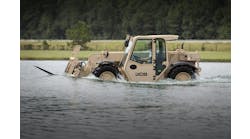Preparation is Key as United Rentals Rolls into High Gear for Hurricane Irene
For United Rentals, the days leading up to Hurricane Irene and the storm’s aftermath were not business as usual. However, the national rental company’s organized approach enabled it to handle the dramatic spikes in demand in a highly organized efficient manner.
The company received a dramatic demand for generators, light towers and dehumidifiers above all, especially power-related equipment as loss of power was widespread through the eastern seaboard. In addition to those three primary equipment categories there was demand for pumps, earthmoving equipment, aerial work platforms, reach forklifts and a wide range of items.
The emergency-response protocol United Rentals had been developing over a number of years helped the company deal with demand. Beginning about four days before the hurricane hit land in North Carolina, the response, coordinated by Matt Flannery, executive vice president of operations and sales, began with daily calls with all the branch managers and other affected managers in the areas where the storm was expected to hit, including resource people, fleet managers, purchasing people and others.
“We began talking about what kind of specific needs related to power, what kind of generators we might need, what aerials and light towers were available,” Flannery told RER. “We moved all those things to three major staging areas. And Dave Stewart, who heads our customer care center, moderates the call and gathers all the information and acts as the point man and finds out daily what the needs are, when branches want to roll their phones over to the customer care center, what kind of fleet they have available so that we’re giving people as accurate and quick a response as we can.”
Flannery emphasized to the team that one of the important considerations was to be able to give customers accurate information. “During emergency response time the last thing you want to do is lead a customer on,” said Flannery. “They need a quick answer because tension is high and time is of optimal value, more so than the normal hectic days of the rental business. You have to give them an answer as quickly as you can because they’re dealing with a lot of pressures and we don’t want to be the source of any extra. We want to be the solution.”
Flannery emphasizes the importance of focusing on employee safety first and foremost, making sure employees and their families are safe, checking to see if any require temporary housing or other needs before figuring out how to serve customers and communities. Flannery stresses to managers that while employees should be willing to do whatever they can do to help customers without taking undue personal risks.
United Rentals set up three staging areas — one in Atlanta, one in Mickelton, N.J.; and another in Raleigh, N.C., where the company could gather as much equipment as possible for rapid deployment to areas of need.
“You want to get close enough so that when they do evacuations or shut down roadways, if you don’t do that until after the storm, you might not be able to get the equipment in to where it is needed,” Flannery said. “So it’s important to do a lot of pre-planning and staging in this emergency-response-type work so we can quickly respond right after the roads are cleared and safe for people to drive.”
Flannery said there are essentially two stages of supply; the pre-storm supply where people are preparing for the storm and then the post-storm cleanup stage. In the case of Irene, pre-storm preparation rental was strong primarily in the coastal areas where people, as normal, expected to be hard hit by the storm. However post-storm work was particularly strong in the inland areas, especially farther north into New England, where people were more likely to expect the storm to weaken and where hurricanes normally have far less impact.
United Rentals does a lot of rental to government agencies such as FEMA, with which the company has an ongoing supply agreement, as well as a variety of utility companies.
Flannery added that branch managers are always reminded that emergency-response situations are no time to take advantage of customers by raising rental rates. “Part of our protocol focusing on these calls is making sure there’s no bad behavior where we jack up prices or charge triple time or any of that kind of practice,” he said. “We stick to whatever the book rate was going into the storm. We want to make sure we’re not taking advantage of a situation like this monetarily. It’s about serving customers and the communities. We could charge pretty much whatever we want on high-demand items, but we think it’s very important for our team and our people to know that we don’t want to be that type of company.”
United Rentals is based in Greenwich, Conn.





